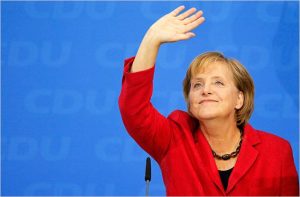 German Chancellor Angela Markel has won a fourth term as the leader of Europe’s most powerful economy, but her victory has been tempered by a palpable surge in support for the alt-right party, Alternative for Germany.
German Chancellor Angela Markel has won a fourth term as the leader of Europe’s most powerful economy, but her victory has been tempered by a palpable surge in support for the alt-right party, Alternative for Germany.
The world, especially post-Brexit Europe, heaved a sigh of relief to see the continent’s most powerful woman back in the saddle for the fourth time, but the entry of the nationalist, racist and pro-Nazi party in the Bundestag has also set alarm bells ringing. The results announced on September 24 saw Merkel’s CDU (Christian Democrats) gaining the largest share of votes, but recording a fall from 41.5% in 2013 to 32% this year.
The AfD threat
Merkel’s center-right CDU and its sister CSU had their share of the vote slashed. Germany’s oldest party, the center-left SPD, which had been in a “grand coalition” with Merkel, was consigned to opposition.
The rise of the AfD (Alternative for Germany) has triggered much anger and dismay because of its anti-immigrant, anti-Europe, and anti-Islam positioning. With the AfD securing about 13.5% of the votes, making it the third-largest group in the national parliament, the Bundestag, a new chapter begins in German politics as it is the first time in more than 60 years that an extreme right-wing party enters parliament.
Keeping in mind Germany’s troubled past, its electorate has so far exercised caution in not allowing a party like AfD to be in parliament. However, with its arrival in Bundestag the country is headed towards a deep polarization similar to the situation the US today finds itself in. Analysts point out that growing social inequality, despite record employment, is also being cleverly used by the AfD, who are most popular in the deindustrialised heartlands of the former communist east.
Tough road ahead for Merkel
While populist voices accuse Merkel of flooding the country with refugees and migrants, the leader of her party’s former coalition partner, Martin Schulz of SPD (social democrats) blames her for her “sleeping pill politics,” keeping Germany in a state of stagnation and lethargy. The SPD also fared poorly with 20% votes and has opted out of the Grand Alliance, making itself the main opposition party in order to sideline the divisive AfD. Foreign Minister Sigmar Gabriel, a Social Democrat, warned the nation that “for the first time since the end of the second World War, real Nazis will sit in the German parliament”.
With Social Democrats in the opposition, Ms Merkel is faced with the difficult task of stitching together a coalition with parties that hold divergent positions on a host of pressing issues. There is a talk that a Jamaican (named so for the parties involved make up the colours of the Jamaican flag) coalition could take shape with the CDU, pro-business party FDP (Free Democratic Party) and the ecological Greens. However, such a possibility has not been publicly acknowledged by politicians either from FDP or the Greens. The other possibility is of a weak minority government making it a tedious negotiating process.
The silver lining, though, is that all mainstream parties are united in their rejection of divisive politics adopted by the neo-Nazis. Her calmness and level-headed persona in dealing with major challenges has made Angela Merkel the most trusted leader of Europe. Her victory surely is a beacon of hope for the polarised international political scene, which is currently presently reeling under short-sighted, volatile leaderships.
(With inputs from Pritha Mahanti)
Author Profile
- India Writes Network (www.indiawrites.org) is an emerging think tank and a media-publishing company focused on international affairs & the India Story. Centre for Global India Insights is the research arm of India Writes Network. To subscribe to India and the World, write to editor@indiawrites.org. A venture of TGII Media Private Limited, a leading media, publishing and consultancy company, IWN has carved a niche for balanced and exhaustive reporting and analysis of international affairs. Eminent personalities, politicians, diplomats, authors, strategy gurus and news-makers have contributed to India Writes Network, as also “India and the World,” a magazine focused on global affairs.
Latest entries
 DiplomacyJanuary 5, 2026India walks diplomatic tightrope over US operation in Venezuela
DiplomacyJanuary 5, 2026India walks diplomatic tightrope over US operation in Venezuela India and the WorldNovember 26, 2025G20@20: Africa’s Moment – The Once and Future World Order
India and the WorldNovember 26, 2025G20@20: Africa’s Moment – The Once and Future World Order DiplomacyOctober 4, 2025UNGA Resolution 2758 Must Not Be Distorted, One-China Principle Brooks No Challenge
DiplomacyOctober 4, 2025UNGA Resolution 2758 Must Not Be Distorted, One-China Principle Brooks No Challenge India and the WorldJuly 26, 2025MPs, diplomats laud Operation Sindoor, call for national unity to combat Pakistan-sponsored terror
India and the WorldJuly 26, 2025MPs, diplomats laud Operation Sindoor, call for national unity to combat Pakistan-sponsored terror







